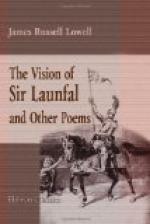[Footnote 13: Undine is the heroine of a romantic tale by Baron De la Motte Fouque. She is represented as a water-nymph who wins a human soul only by a union with mortality which brings pain and sorrow.]
[Footnote 14: The village blacksmith of Longfellow’s well-known poem. The prophecy came true as regards the hewing-down of the chestnut-tree which was cut down in 1876.]
Dear
native town! whose choking elms each year
With eddying dust
before their time turn gray,
Pining
for rain,—to me thy dust is dear;
It glorifies the
eve of summer day,
And
when the westering sun half sunken burns,
250
The
mote-thick air to deepest orange turns,
The westward horseman rides
through clouds of gold away,
So
palpable, I’ve seen those unshorn few,
The six old willows
at the causey’s end
(Such
trees Paul Potter never dreamed nor drew),
255
Through this dry
mist their checkering shadows send,
Striped,
here and there, with many a long-drawn thread,
Where
streamed through leafy chinks the trembling red,
Past which, in one bright
trail, the hangbird’s flashes blend.
Yes,
dearer for thy dust than all that e’er,
260
Beneath the awarded
crown of victory,
Gilded
the blown Olympic charioteer;
Though lightly
prized the ribboned parchments three,
Yet
collegisse juvat, I am glad[15]
That
here what colleging was mine I had,—
265
It linked another tie, dear
native town, with thee!
[Footnote 15: Collegisse juvat. Horace in his first ode says, Curriculo pulverem Olympicum Collegisse juvat; that is: It’s a pleasure to have collected the dust of Olympus on your carriage-wheels. Mr. Lowell, helping himself to the words, says, “It’s a pleasure to have been at college;” for college in its first meaning is a collection of men, as in the phrase “The college of cardinals.”]
Nearer
art thou than simply native earth,
My dust with thine
concedes a deeper tie;
A
closer claim thy soil may well put forth,
Something of kindred
more than sympathy; 270
For
in thy bounds I reverently laid away
That
blinding anguish of forsaken clay,
That title I seemed to have
in earth and sea and sky,
That
portion of my life more choice to me
(Though brief,
yet in itself so round and whole)[16] 275
Than
all the imperfect residue can be;—
The Artist saw
his statue of the soul
Was
perfect; so, with one regretful stroke,
The
earthen model into fragments broke,
279
And without her the impoverished
seasons roll.




